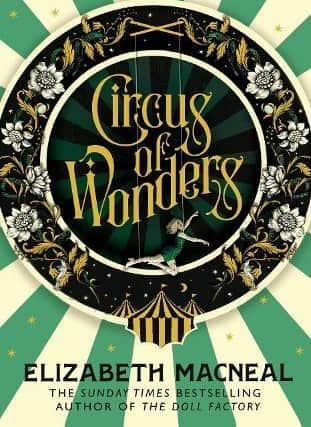Book review: Circus of Wonders, by Elizabeth Macneal


Elizabeth Macneal had a critical and popular success with her first novel, The Doll Factory, which centred on the Great Exhibition of 1851. Circus of Wonders is set a few years later, two of the characters having experienced the Crimean War, and it has many of the same fine qualities as the earlier book, though it gives the impression of a novel that hasn’t been lived with for so long and is, in consequence perhaps, more fanciful than imaginative, but nevertheless engaging and enjoyable.
The Circus of Wonders is a circus of human freaks and animals doing surprising things, sometimes in surprising partnerships. Such circuses were popular shows, and, though we may now regard the exhibition of human oddities – a giantess, a bearded woman and such like – with distaste and disapproval, Macneal has the understanding to show that being exhibited for public amusement may have been preferable to any alternative then on offer. So the heroine, Nell, whose whole body is coloured and disfigured by birthmarks, and who has laboured in wretched poverty picking violets and crystalising them for sale, discovers after her first anger and misery on being sold by her father (price 20 pounds), to the ambitious impresario who styles himself Jasper Jupiter, that becoming a celebrity offers rewards never dreamed of in her miserable village where, anyway, her protector and much-loved brother is now being diverted by love for a normal – unblemished – girl and the prospect of marriage.
Advertisement
Hide AdJupiter, a veteran of the Crimea, exploits his unfortunate charges; they exist to enable him to fulfil his ambition of becoming rich and famous. Why shouldn’t his circus perform before Queen Victoria, he wonders, delighting her, even drawing her from her reclusive widowhood? It would be a dull reader who didn’t suspect that his ambition might overleap itself. Yet, ruthless as he may be, he cares for his charges. You might compare him to a farmer who rears his cattle for profitable slaughter, but nevertheless feels a responsibility, even a tenderness, for them. He has a similar feeling for his shy and awkward brother Toby, a photographer, burdened by guilt for a death in the Crimea. One of the strengths of the novel is that nether Jasper nor Toby is a one-dimensional character.


Macneal has a keen eye and a nice turn of phrase. The Circus and its cast of damaged but resilient characters are vividly and persuasively presented. She is inventive and writes with an easy charm. Her word-painting is good – descriptions of costumes and the show which Nellie puts on in the circus are quite admirable.
The novel is, for the most part written in the present tense, as is fashionable now, and it has the characteristic strengths and weaknesses of this practice. That is to say, it is good at making the reader see but much less good at telling a story. It is a tiresomely static way of writing a novel, more like an exhibition in a gallery than a film. The natural way of telling a story is in the past tense, which allows the writer to move forward but also to cast back. That has been the method of almost all great writers of narrative. I often think it would be an interesting experiment to ask an aspiring author to re-write a chapter of, say, Kidnapped in the present tense; he or she would, I suspect, find that the life had been sucked out of it. There is life here in Circus of Wonders, but much of the time it is a still-life.
There are great novelists, Dickens for example, who use the present tense part of the time. They do so to set a scene or pause for a moment’s reflection. But they sense that there can be too much of it; that is makes for static prose. So they switch to the past to move things along. Moreover it almost always seems that writing mostly in the present tense leads to self-indulgence, and I think Macneal can’t be acquitted of that charge. She is a talented writer with enviable gifts, but there are too many pages where the scene-painting cloys.
Circus of Wonders, by Elizabeth Macneal, Picador, 374p, £14.99
A message from the Editor
Thank you for reading this article. We're more reliant on your support than ever as the shift in consumer habits brought about by coronavirus impacts our advertisers.
If you haven't already, please consider supporting our trusted, fact-checked journalism by taking out a digital subscription at https://www.scotsman.com/subscriptions